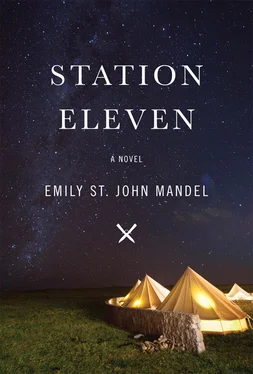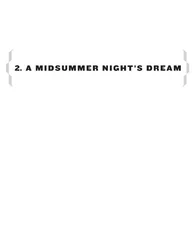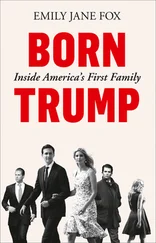“I still think you invented the parallel-universe theory,” she said, but one of the few things that August didn’t know about her was that sometimes when she looked at her collection of pictures she tried to imagine and place herself in that other, shadow life. You walk into a room and flip a switch and the room fills with light. You leave your garbage in bags on the curb, and a truck comes and transports it to some invisible place. When you’re in danger, you call for the police. Hot water pours from faucets. Lift a receiver or press a button on a telephone, and you can speak to anyone. All of the information in the world is on the Internet, and the Internet is all around you, drifting through the air like pollen on a summer breeze. There is money, slips of paper that can be traded for anything: houses, boats, perfect teeth. There are dentists. She tried to imagine this life playing out somewhere at the present moment. Some parallel Kirsten in an air-conditioned room, waking from an unsettling dream of walking through an empty landscape.
“A parallel universe where space travel was invented,” August said. This was a game they’d been playing for a decade. They were lying on their backs now, sedated by heat. Birch branches swayed in the breeze, sunlight filtering through green. Kirsten closed her eyes and watched the silhouettes of leaves float away under her eyelids.
“But space travel was invented, wasn’t it? I’ve seen pictures.” Her hand drifted up to the scar on her cheekbone. If there were better universes, then there were probably much worse ones. Universes where she remembered her first year on the road, for instance, or where she remembered what had caused the scar on her face, or where she’d lost more than two teeth.
“We just went up to that gray moon,” August said. “Nowhere else, we never went farther. I mean the kind of space travel you’d see in TV shows, you know, other galaxies, other planets.”
“Like in my comic books?”
“Your comics are weird. I was thinking more like Star Trek .”
“A parallel universe where my comics are real,” she said.
“What do you mean?”
“I mean a parallel universe where we boarded Station Eleven and escaped before the world ended,” Kirsten said.
“The world didn’t end ,” he said. “It’s still spinning. But anyway, you’d want to live on Station Eleven?”
“I think it’s beautiful. All those islands and bridges.”
“But it’s always night or twilight, isn’t it?”
“I don’t think I’d mind.”
“I like this world better,” August said. “Does Station Eleven even have an orchestra? Or would it just be me standing there by myself on the rocks in the dark, playing my violin for giant seahorses?”
“Okay, a parallel universe with better dentistry,” she said.
“You aim high, don’t you?”
“If you’d lost any teeth, you’d know how high I’m aiming.”
“Fair enough. I’m sorry about your teeth.”
“A parallel universe where I have no knife tattoos.”
“I’d like to live there too,” August said. “A parallel universe where Sayid and Dieter didn’t disappear.”
“A parallel universe where telephones still work, so we could just call the Symphony and ask them where they are, and then we’d call Dieter and Sayid and all of us would meet up somewhere.”
They were quiet, looking up at the leaves.
“We’ll find them,” Kirsten said, “we’ll see the Symphony again,” but of course they couldn’t be sure.
They dragged their suitcases down the embankment to the road. They were very close to Severn City now. At twilight the road curved back to the lakeshore, and the first houses of Severn City appeared. Young birch trees between the road and the lake but otherwise no forest, just overgrown lawns and houses submerged in vines and shrubbery, a beach of rocks and sand.
“I don’t want to do this at night,” August said. They chose a house at random, waded through the backyard and made camp behind a garden shed. There was nothing to eat. August went exploring and came back with blueberries.
“I’ll take the first watch,” Kirsten said. She was exhausted but she didn’t think she could sleep. She sat on her suitcase, her back against the wall of the shed, a knife in her hands. She watched the slow rise of fireflies from the grass and listened to the water on the beach across the road, the sighing of wind in the leaves. A beating of wings and the squeak of a rodent, an owl making a kill.
“Remember that man we met at the gas station?” August asked. She’d thought he was asleep.
“Of course. What about him?”
“That scar on his face.” He sat up. “I was just thinking about it, and I realized what it is.”
“The prophet marked him.” The memory was agitating. She flicked her wrist and her knife split the cap of a white mushroom a few feet away.
“Yes, but the symbol itself, the pattern of the scar. How would you describe it?”
“I don’t know,” she said, retrieving her knife. “It looked like a lowercase t with an extra line through the stem.”
“A shorter line. Toward the bottom. Think about it. It isn’t abstract.”
“I am thinking about it. It looked abstract to me.”
“It’s an airplane,” August said.
TWO WEEKS BEFOREthe end of commercial air travel, Miranda flew to Toronto from New York. It was late October, and she hadn’t been back to Canada in some months. She’d always liked the descent into this city, the crowded towers by the lakeshore, the way an infinite ocean of suburbia rushed inward and came to a point at the apex of the CN Tower. She thought the CN Tower was ugly up close, but unexpectedly lovely when viewed from airplane windows. And as always, the sense of Toronto existing in layers: the city that had shocked her with its vastness when she’d arrived here from Delano Island at seventeen still existed, but it occupied the same geographical space as a city that now seemed much smaller to her, a place diluted by the years she’d spent moving between London, New York, the harbor cities of Asia. The plane descended into the suburbs. She passed through passport control without incident, the Canada Border Services agent struggling to find an unstamped corner in the pages of her passport, and boarded a waiting car to the Toronto headquarters of Neptune Logistics, where she wished the driver a good day and passed him a twenty-dollar bill over the back of the seat.
“Thank you,” he said, surprised. “Would you like some change?”
“No, thank you.” She had been overtipping for as long as she’d had money. These small compensations for how fortunate she’d been. She pulled her carry-on suitcase into the Neptune Logistics lobby, cleared building security and took the elevator to the eighteenth floor.
She saw ghosts of herself everywhere here. A twenty-three-year-old Miranda with the wrong clothes and her hair sticking up, washing her hands and peering anxiously at herself in the ladies’ room mirror; a twenty-seven-year-old recently divorced Miranda slouching across the lobby with her sunglasses in place, wishing she could disappear, in tears because she’d seen herself on a gossip website that morning and the headline was agonizing: IS ARTHUR SECRETLY CALLING MIRANDA? (Answer: no.) Those previous versions of herself were so distant now that remembering them was almost like remembering other people, acquaintances, young women whom she’d known a long time ago, and she felt such compassion for them. “I regret nothing,” she told her reflection in the ladies’ room mirror, and believed it. That day, she attended a series of meetings, and in the late afternoon another car delivered her to a hotel. She still had an hour or two to kill until it was time to see Arthur again.
Читать дальше












